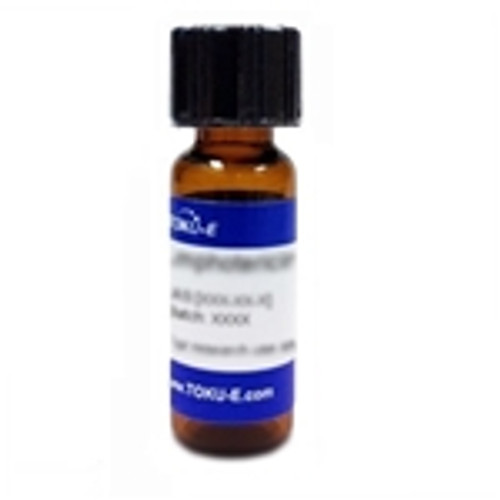Ramoplanin is a cyclic lipoglycodepsipeptide antimicrobial. It is a complex of structurally related molecules with Ramoplanin A2 as the primary component. Ramoplanin was isolated in the early 1980s as the major metabolite of a strain of Actinoplanes. It is a therapeutic peptide, effective against Gram-positive bacteria including MRSA and MRSE.
Ramoplanin is soluble in ethanol, methanol, DMF and DMSO.
| Mechanism of Action | Ramoplanin binds to the peptidoglycan intermediate Lipid II, blocking its polymerization to form the carbohydrate chains of peptidoglycan, resulting in inhibition of bacterial cell wall biosynthesis. |
| Microbiology Applications | Ramoplanin is effective against antibiotic-resistant Clostridium difficile infection of the gastrointestinal tract. It can be used to study antibiotic-resistant enterococci. Ramoplanin is commonly used in clinical in vitro microbiological antimicrobial susceptibility tests (panels, discs, and MIC strips) against Gram positive isolates. Medical microbiologists use AST results to recommend antibiotic treatment options. For representative MIC values form the Antimicrobial Index, click here. |
| Molecular Formula | C119H154ClN21O40 (for A2) |
| References | Cavalleri B et al (1984) A-16686, a new antibiotic from Actinoplanes. I. Fermentation, isolation and preliminary physico-chemical characteristics. J. Antibiot. 37:309 Chen L (2004) Dissecting ramoplanin: mechanistic analysis of synthetic ramoplanin analogues as a guide to the design of improved antibiotics. J Am Chem Soc.126(24):7462-7463 PMID 15198592 Farver DK et al (2005) Ramoplanin: a lipoglycodepsipeptide antibiotic. . Ann. Pharmacother. 39:863 Johnson C.C. et al. (1992) Bactericidal activity of ramoplanin against antibiotic-resistant enterococci. Antimicrob. Agents Chemother. 36:2342 Van Bambeke F (2006) Glycopeptides and glycodepsipeptides in clinical development: a comparative review of their antibacterial spectrum, pharmacokinetics and clinical efficacy. Curr.Opin. Investig. Drugs. 7(8):740-749 PMID 16955686 |



